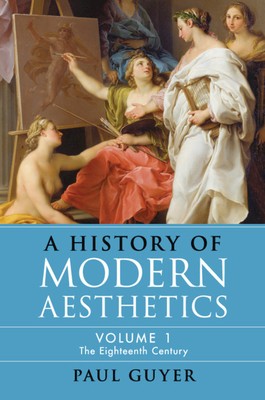
- We will send in 10–14 business days.
- Author: Paul Guyer
- Publisher: Cambridge University Press
- ISBN-10: 1108733816
- ISBN-13: 9781108733816
- Format: 15.2 x 22.9 x 3.4 cm, softcover
- Language: English
- SAVE -10% with code: EXTRA
Reviews
Description
Volume I: The development of aesthetics was one of the great accomplishments of eighteenth-century philosophy, as the classical conception of aesthetic experience as a form of knowledge came under pressure from increasing recognition of the emotional impact of art and from increasing emphasis on the value of freedom in the moral and political thought of the century. This opening volume of A History of Modern Aesthetics recounts how philosophers in Britain, France, and Germany developed these new approaches and searched for ways to combine them with the cognitivism of traditional aesthetics. A History of Modern Aesthetics narrates the history of philosophical aesthetics from the beginning of the eighteenth century through the twentieth century. Aesthetics began with Aristotle's defense of the cognitive value of tragedy in response to Plato's famous attack on the arts in The Republic, and cognitivist accounts of aesthetic experience have been central to the field ever since. But in the eighteenth century, two new ideas were introduced: that aesthetic experience is important because of emotional impact - precisely what Plato criticized - and because it is a pleasurable free play of many or all of our mental powers. This book tells how these ideas have been synthesized or separated by both the best-known and lesser-known aestheticians of modern times, focusing on Britain, France, and Germany in the eighteenth century; Germany and Britain in the nineteenth; and Germany, Britain, and the United States in the twentieth.
EXTRA 10 % discount with code: EXTRA
The promotion ends in 19d.15:49:52
The discount code is valid when purchasing from 10 €. Discounts do not stack.
- Author: Paul Guyer
- Publisher: Cambridge University Press
- ISBN-10: 1108733816
- ISBN-13: 9781108733816
- Format: 15.2 x 22.9 x 3.4 cm, softcover
- Language: English English
Volume I: The development of aesthetics was one of the great accomplishments of eighteenth-century philosophy, as the classical conception of aesthetic experience as a form of knowledge came under pressure from increasing recognition of the emotional impact of art and from increasing emphasis on the value of freedom in the moral and political thought of the century. This opening volume of A History of Modern Aesthetics recounts how philosophers in Britain, France, and Germany developed these new approaches and searched for ways to combine them with the cognitivism of traditional aesthetics. A History of Modern Aesthetics narrates the history of philosophical aesthetics from the beginning of the eighteenth century through the twentieth century. Aesthetics began with Aristotle's defense of the cognitive value of tragedy in response to Plato's famous attack on the arts in The Republic, and cognitivist accounts of aesthetic experience have been central to the field ever since. But in the eighteenth century, two new ideas were introduced: that aesthetic experience is important because of emotional impact - precisely what Plato criticized - and because it is a pleasurable free play of many or all of our mental powers. This book tells how these ideas have been synthesized or separated by both the best-known and lesser-known aestheticians of modern times, focusing on Britain, France, and Germany in the eighteenth century; Germany and Britain in the nineteenth; and Germany, Britain, and the United States in the twentieth.


Reviews